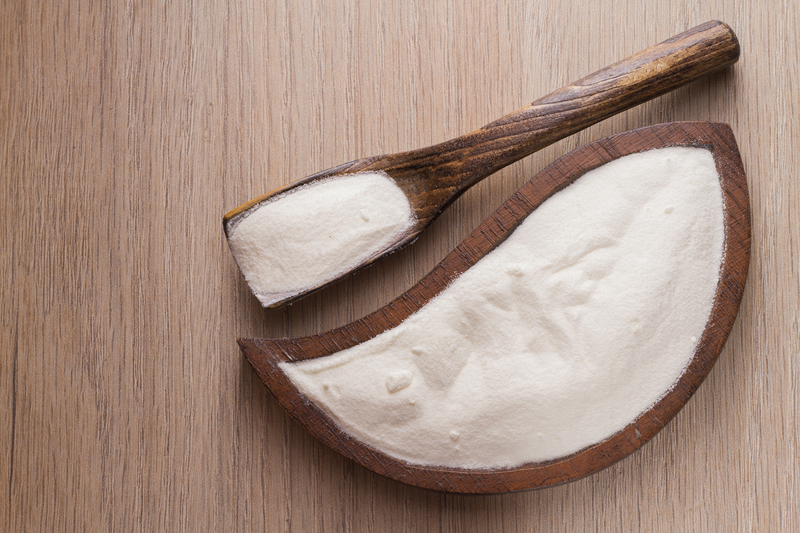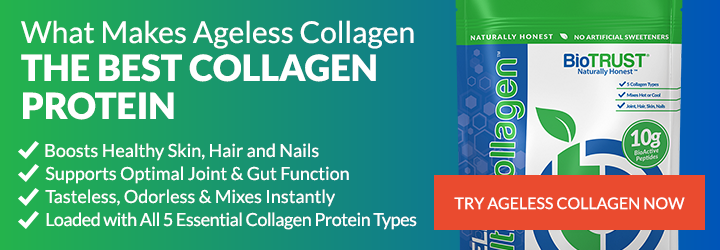Do Collagen Supplements Actually Work? (or just hype)

“Show me the data!” I can’t tell you how many times my mates and I heard those four words from our hardcore researcher professors during our graduate school studies in Exercise Physiology at the University of Texas. (Hook ‘em Horns!) While it irked us at times—and still haunts us today—we remain indebted with gratitude. To this day, our questions, claims, and hypotheses are grounded in scientific evidence. And as the buzz about collagen supplements has gotten progressively louder and more relentless, I’ve only heard one question: Do collagen supplements actually work? (Or, is it just a bunch of marketing hype?)
Please allow me to show you the data.
Collagen Supplements: A Cinderella Story
If you’re not intimately familiar with collagen protein, I encourage you to take a minute to learn a bit about what collagen is. I also urge you to take a deeper dive into how collagen works in the body and the roles it plays. It’s truly fascinating. And when you consider its tainted history, you’ll see collagen’s rise to fame is quite a Cinderella story.
Assuming you have some of that background under your belt, let’s unpack some of the research. Note there are more studies—quite a few more, in fact—in humans as well as animals and cell cultures. While we’re going to look at some of the main areas of study, I’ll let the cat out of the bag by saying supplementation with collagen peptides (i.e., hydrolyzed collagen, collagen hydrolysates) has been shown to support:
- Healthy, firm, young-looking skin 1,2
- Strong, healthy fingernails 3
- Healthy, mobile joints 4,5
- Strong, healthy bones 6
- Healthy, strong tendons and ligaments 7
- Healthy appetite management 8,9
- Help building muscle and strength and reducing body fat 10
- Gut health 11
Let’s dig into a few of the particular studies by category…
1. Collagen and Skin & Nail Health
In a double-blind, placebo-controlled study published in the journal Skin Pharmacology and Physiology, a group of researchers from the Department of Dermatology at the University of Kiel in Germany set out to see the effects of collagen supplementation on markers of skin aging. This included wrinkles, hydration, and elasticity.
For 8 weeks, 114 women, ages 45 – 65, received either 2.5 g of collagen peptides or a placebo once daily. After just 4 weeks, the researchers discovered supplementation with collagen led to a significant reduction in wrinkles around the eyes compared to the placebo group.
After 8 weeks of supplementation, the women in the collagen group showed significantly higher levels of the “youth” proteins collagen and elastin in their skin. This provided evidence that supplementation “worked” to increase the body’s production of collagen. What’s more, the researchers noted a significant improvement in skin elasticity in the women who used collagen compared to the women given the placebo. 1
In a double-blind, placebo-controlled clinical study published in the Journal of Medicinal Food, a group of researchers from Germany and Brazil set out to see if supplementation with collagen peptides may help reduce cellulite. This complex problem is estimated to affect up to 85% of women over the age of 20.
For 6 months, 105 normal and overweight women, ages 24 – 50, with moderate cellulite were randomized to receive either 2.5 g of collagen peptides or a placebo for 6 months. At the end of the study, the researchers discovered regular supplementation with collagen decreased the degree of cellulite, reduced skin waviness, and improved dermal density. Interestingly, the effects were more pronounced in normal-weight women. These findings led the researchers to conclude oral supplementation with collagen peptides “leads to an improvement of cellulite and has a positive impact on skin health.” 2
In an open-label, single-center trial published in the Journal of Cosmetic Dermatology, a group of researchers from Germany and Brazil investigated whether daily supplementation with collagen peptides improves fingernail health and growth.
In the study, 25 participants took 2.5 g of collagen peptides once daily for 24 weeks. Nail growth rate and the frequency of cracked and/or chipped nails was evaluated throughout the intervention as well as 4 weeks after stopping supplementation.
The researchers found regular supplementation with collagen peptides resulted in a 12% increase in nail growth rate and a 42% decrease in the frequency of broken nails. What’s more, 64% of the participants reported improvement in brittle nails. And 88% of participants experienced improvement even 4 weeks after they stopped supplementation.
Overall, 80% of the participants agreed supplementation with collagen peptides improved the appearance of their nails, and the researchers concluded daily supplementation with collagen peptides “increased nail growth and improved brittle nails in conjunction with a notable decrease in the frequency of broken nails.” 3
In a randomized, placebo-controlled study published in the Journal of Cosmetic and Laser Therapy, researchers from the Department of Dermatology at Chung-Ang University College of Medicine in Seoul, South Korea, evaluated the effects of daily supplementation with collagen peptides on skin health.
Thirty-two healthy participants were randomized to receive either 3 g of collagen peptides, 3 g of collagen peptides plus 500 mg of vitamin C, 500 mg of vitamin C (i.e., no collagen), or no supplement (i.e., placebo) for 12 weeks. The researchers found daily collagen peptide supplementation improved skin hydration and elasticity.
Interestingly—and contrary to what some supplement companies may lead you to believe—the addition of vitamin C did not lead to better results. In fact, the researchers concluded, “Daily collagen peptide supplementation may improve skin hydration and elasticity, but concomitant intake of low-dose vitamin C did not enhance the effect of collagen peptides on skin properties.” 12
2. Collagen and Joint, Bone, & Tendon Health
In a randomized, double-blind, controlled trial published in the International Journal of Food Sciences and Nutrition, researchers from Barcelona, Spain, evaluated the effectiveness of supplementation with hydrolyzed collagen for improving joint comfort.
For 6 months, 250 participants with knee-joint discomfort were given 10 g of hydrolyzed collagen daily. At the end of the study, the researchers found collagen supplementation led to significant improvement in knee-joint comfort. 4
In a double-blind, placebo-controlled study published in the journal Current Medical Research and Opinion, researchers from Penn State University examined the effects of hydrolyzed collagen supplementation on activity-related joint discomfort in healthy, physically-active athletes.
For 24 weeks, 147 young adults (72 male, 75 female) were given either 10 g of hydrolyzed collagen or a placebo. At the end of the study, the researchers found that the group that supplemented with collagen experienced significant improvements in joint discomfort at rest, when walking, when standing, when carrying objects, when lifting, when running, and when changing direction. The authors of the study concluded that hydrolyzed collagen can be used to help support joint health and help reduce the risk of joint deterioration. 5
In a double-blind, placebo-controlled study published in the journal Nutrients, German researchers investigated the effects of daily supplementation with collagen peptides on bone-mineral density in postmenopausal women.
For 12 months, 102 women (average age of 64 years) were randomly assigned to receive either 5 g of collagen peptides or a placebo daily. Upon completion, the researchers found the women supplementing with collagen peptides experienced significant increases in bone mineral density of the spine and femoral (thigh bone) neck. In addition, the researchers noted collagen peptide supplementation was also associated with a favorable shift in bone markers, indicating increased bone formation and reduced bone breakdown. 6
Even more, a recent International Olympic Committee (IOC) consensus statement on dietary supplements in high-performance athletes proposed that supplementation with collagen peptides could potentially be useful for athletes. This, of course, is based on research showing that increased intake of collagen peptides has been shown to augment collagen synthesis and reduce joint- and tendon-related joint discomfort. 13
Along these lines, in a recent cross-over pilot study published in the journal Nutrients, Australian researchers investigated whether supplementation with collagen peptides (combined with structured exercise) improved symptoms and tendon vascularization in subjects with tendon-related discomfort.
Participants were given a placebo or 2.5 g of collagen peptides in combination with a twice-daily calf-strengthening program for three months. After three months, the participants “crossed over” to the other condition. In other words, some participants used the collagen for three months, then the placebo for three months, and vice versa.
At the end of the study, the main finding was that, regardless of the order, supplementation with collagen peptides accelerated the clinical benefits of the strengthening program, ultimately helping the athletes return to activity.14
3. Collagen and Appetite & Body Composition
In a clinical trial published in the journal Clinical Nutrition, researchers from the Department of Human Biology of the Nutrition and Toxicology Research at Maastricht University in The Netherlands evaluated the satiating effects of collagen protein compared to other protein sources.
In the study, 24 healthy participants (average age 25 years old) received a breakfast custard made with casein, soy, whey, alpha-lactalbumin, collagen peptides, or collagen peptides plus tryptophan (an essential amino acid naturally missing from collagen) as the protein source.
They found the breakfast containing collagen peptides (either with or without tryptophan) resulted in a significant 20% lower caloric intake at lunch compared to the other protein sources. The reduced caloric intake was the result of the collagen protein supplements leading to 40% lower appetite rating. In other words, collagen peptides were more satiating, they had a more pronounced effect on appetite, and they led to a significant reduction in subsequent caloric intake. 8
In a double-blind, placebo-controlled study published in the British Journal of Nutrition, German researchers assessed the influence of supplementation with collagen peptides on muscle mass and muscle function following resistance training in older participants.
Fifty-three men (average age of 72) were involved in the study. They all participated in a 12-week resistance training program, which involved three days of weight training each week, and they supplemented with either 15 g of collagen peptides or placebo after exercise.
Following the program, the men supplementing with collagen peptides had gained significantly more fat-free mass (e.g., muscle) and strength. They had also lost significantly more body fat compared to the placebo group, which did improve from baseline as well (just not nearly as much).
The researchers concluded, “Compared with placebo, collagen peptide supplementation in combination with resistance training further improved body composition by increasing fat-free mass, muscle strength, and the loss in fat mass.” This is a key finding because of collagen’s long-standing reputation as an incomplete, “inferior,” and “cheap” source of protein. 10
Show Me the Data
There’s a lot to unpack here, right? The crazy thing is this is only a “highlight reel” of all the published studies on collagen peptides covering some of the key benefits. In addition to improvements in skin health and joint comfort, I have also personally noticed improvements in sleep quality, which I attribute to the glycine, a relaxing neurotransmitter found in robust quantities in collagen.
There are quite literally dozens of human clinical trials demonstrating the promise of collagen hydrolysates. And there are even more animal and cell culture studies further fortifying the potential health-promoting properties of these bioactive collagen peptides. If one of my grad-school professors were to call on me at this very moment, I would feel very confident showing him the data.
Have you tried supplementing with collagen peptides? If so, what have you experienced? Please share your questions and comments below. I’d love to hear from you!







